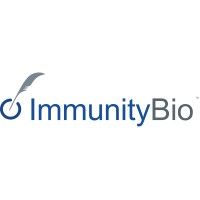预约演示
更新于:2025-05-07

ImmunityBio, Inc.
更新于:2025-05-07
概览
标签
肿瘤
感染
泌尿生殖系统疾病
预防性疫苗
治疗性疫苗
融合蛋白
疾病领域得分
一眼洞穿机构专注的疾病领域
暂无数据
技术平台
公司药物应用最多的技术
暂无数据
靶点
公司最常开发的靶点
暂无数据
| 排名前五的药物类型 | 数量 |
|---|---|
| 预防性疫苗 | 5 |
| 治疗性疫苗 | 5 |
| 重组载体疫苗 | 4 |
| 融合蛋白 | 4 |
| 基因疗法 | 2 |
| 排名前五的靶点 | 数量 |
|---|---|
| IL15R(白细胞介素-15受体) | 2 |
| TBXT | 1 |
| CD 66抗原 x CEA | 1 |
| MUC1(黏蛋白-1) | 1 |
| KLK3(前列腺特异性抗原) | 1 |
关联
53
项与 ImmunityBio, Inc. 相关的药物靶点 |
作用机制 IL15R激动剂 [+1] |
在研适应症 |
最高研发阶段批准上市 |
首次获批国家/地区 美国 |
首次获批日期2024-04-22 |
作用机制 DNA嵌入剂 [+1] |
在研适应症 |
非在研适应症 |
最高研发阶段临床3期 |
首次获批国家/地区- |
首次获批日期- |
作用机制 IL-2R拮抗剂 [+1] |
最高研发阶段临床2期 |
首次获批国家/地区- |
首次获批日期- |
108
项与 ImmunityBio, Inc. 相关的临床试验NCT06829823
Phase 2 Clinical Trial of Ablation Therapy With Intravesical N-803 In Combination With BCG or Gemcitabine in Participants With Intermediate-Risk Non-Muscle Invasive Papillary Bladder Cancer
This is an open-label, phase 2, randomized study of intravesical N-803 plus BCG (experimental arm A) and intravesical N-803 plus gemcitabine (experimental arm B) in participants who have intermediate-risk Ta/T1 papillary disease. The primary objective of this study is to evaluate the efficacy of these experimental therapies without the need for surgical intervention by CR rate at month 3 or month 6 (for re-inducted participants).
开始日期2025-05-01 |
申办/合作机构 |
NCT06745908
ResQ201A: Randomized, Open-Label, Phase 3 Clinical Trial of N-803 Plus Tislelizumab and Docetaxel Versus Docetaxel Monotherapy in Participants With Advanced or Metastatic Non-Small Cell Lung Cancer Who Have Acquired Resistance to Immune Checkpoint Inhibitor Therapy
This is a randomized, open-label, phase 3 clinical trial to compare the efficacy and safety of N-803 plus tislelizumab and docetaxel (experimental arm) versus docetaxel monotherapy (control arm). Enrolled participants will be randomized 2:1 to treatment in the experimental arm or the control arm. Participant randomization will be stratified by geographical region (North America vs Europe vs ASIA vs Other), NSCLC histology (squamous vs nonsquamous), and actionable genomic alteration (AGA); (epidermal growth factor receptor [EGFR]/anaplastic lymphoma kinase [ALK] vs OTHER AGA vs No AGA).
开始日期2025-03-01 |
申办/合作机构 |
NCT06710288
A Phase 2, Open-label, Single-arm Study of Autologous Memory Cytokine Enriched Natural Killer (M-CENK) Adoptive Cell Therapy and N-803 (IL-15 Superagonist) in Combination with Gemcitabine in Participants with Recurrent Platinum-Resistant High-Grade Ovarian Cancer
This is phase 2 single arm study evaluating the safety and preliminary efficacy of M-CENK adoptive cell therapy and fixed dose of N-803 in combination with gemcitabine in participants with platinum-resistant high-grade ovarian cancer (HGOC).Up to 20 participants will receive M-CENK (IV) and N-803 (SC) in combination with gemcitabine (IV).
Participants will undergo an apheresis procedure for the collection of mononuclear cells (MNCs) at least 1 day prior to Cycle 1 for manufacturing of M-CENK. Starting in Cycle 1, participants will receive gemcitabine and starting in Cycle 2 they will also receive M-CENK and N-803, until no additional M-CENK is available or confirmed PD per iRECIST, unless the participant is potentially deriving benefit per Investigator's assessment.
Participants who complete the study treatment or discontinue study treatment will be followed for survival/disease status every 12 weeks (± 2 weeks) for up to 12 months after the last study treatment or until death, lost to follow-up, or withdrawal of consent.
Participants will undergo an apheresis procedure for the collection of mononuclear cells (MNCs) at least 1 day prior to Cycle 1 for manufacturing of M-CENK. Starting in Cycle 1, participants will receive gemcitabine and starting in Cycle 2 they will also receive M-CENK and N-803, until no additional M-CENK is available or confirmed PD per iRECIST, unless the participant is potentially deriving benefit per Investigator's assessment.
Participants who complete the study treatment or discontinue study treatment will be followed for survival/disease status every 12 weeks (± 2 weeks) for up to 12 months after the last study treatment or until death, lost to follow-up, or withdrawal of consent.
开始日期2025-03-01 |
申办/合作机构 |
100 项与 ImmunityBio, Inc. 相关的临床结果
登录后查看更多信息
0 项与 ImmunityBio, Inc. 相关的专利(医药)
登录后查看更多信息
150
项与 ImmunityBio, Inc. 相关的文献(医药)2025-04-21·Cancer Research
Abstract 894: Generation of cytokine-induced memory-like PD-L1 t-haNK (NK-92®) cells
作者: Segaran, Devapriya ; Elwood, Dustin ; Soon-Shiong, Patrick ; Boissel, Laurent ; Klingemann, Hans ; Thibault, Joseph ; Saxena, Manju ; Godbole, Vidya
2025-04-21·Cancer Research
Abstract 885: Generation and characterization of NK-92®(aNK™) cells with hypoimmunogenic modifications
作者: Hin Fung, Ivan Ting ; Boissel, Laurent ; Klingemann, Hans ; Soon-Shiong, Patrick
2025-04-21·Cancer Research
Abstract 890: NK-92® (aNK™) whole cell lysate exerts potent cytotoxic and anti-proliferative activity on tumor cells
作者: Saxena, Manju ; Klingemann, Hans ; Boissel, Laurent ; Bickett, Thomas ; Chinnapen, Himani ; Soon-Shiong, Patrick ; Godbole, Vidya ; Fleenor, Courtney
339
项与 ImmunityBio, Inc. 相关的新闻(医药)2025-04-27
·研发客
// •RAG-01在安全性和疗效上均展现优势,最低两个剂量组完全缓解(CR)率达到66.7%;•抑癌基因p21有翔实的靶点研究基础,选择其作为首个靶点与RNA激活的原理有关;•LiCO系统突破了膀胱递送难题,还能实现多个难递送器官的高效持久递送;•团队打通了整体技术路径,并建立新一代小激活RNA药物开发平台;•中美瑞康是全球唯一一家同时把小激活RNA和小干扰RNA推到临床的公司。上个月,在全球泌尿外科领域极具影响力的学术会议EAU(欧洲泌尿外科学会年会)的最新突破性进展专场上,来自中美瑞康(Ractigen Therapeutics)的小激活RNA(saRNA)疗法RAG-01,凭借其在治疗卡介苗失败的非肌层浸润性膀胱癌(NMIBC)患者中展现的安全性数据和高达66.7%的完全缓解率,引起了广泛关注。“对于小激活RNA这种全新药物模式来说,RAG-01的积极数据是历史性的突破。我们通过这个项目首次在人体中观察到小激活RNA在发挥作用,而且有非常好的安全性。在患者中展现的出色疗效,预示着它有望为这类难治性膀胱癌提供一种全新的、保留膀胱的治疗选择。”中美瑞康创始人兼CEO李龙承博士强调。李龙承还有另一重身份,即RNA激活领域的开拓者。2006年任职于加州大学旧金山分校(UCSF)期间,他和团队在全球首次发现并命名RNA激活(RNAa)这一生命现象。此后,李龙承就一直期待亲手将这项技术转化到临床。李龙承博士在两次错失获得UCSF授权RNAa知识产权的机会之后,2017年,李龙承终于开始追逐梦想,创办了中国首家以RNA激活为核心技术的生物制药公司——中美瑞康。七年多后,这家公司迎来了首款产品RAG-01早期人体数据的出炉。“这个结果我等了将近20年。”李龙承接受研发客采访时感叹。安全与疗效双重突破在UCSF从事博士后研究工作之前,李龙承曾有13年国内泌尿外科医生的执业经历,对膀胱癌及患者的痛苦有着深刻的理解。“对于卡介苗治疗失败或复发患者,临床推荐的是全膀胱切除,随后需要做尿路改道或者原位回肠新膀胱,这对生存质量有极大影响。临床急需更好的治疗方法预防肿瘤复发,让患者保留膀胱。”李龙承说。过去几年,随着默沙东的PD-1抑制剂Keytruda、辉凌制药基因疗法Adstiladrin及ImmunityBio的IL-15超级激动剂Anktiva相继获批,NMIBC二线治疗结局得到了极大改善,但未满足的临床需求依然明显。RAG-01被设计具备双重作用机制:一方面,通过RNAa特异性激活抑癌基因p21的表达,直接抑制肿瘤细胞生长;另一方面,利用精密的化学修饰保留部分双链RNA的免疫刺激活性,实现额外的抗肿瘤效果。据李龙承介绍,与上述三款最近获批的疗法相比,RAG-01的优势在安全性和疗效上均有所体现。它在膀胱灌注后反应温和,所有治疗相关不良事件(AEs)均为轻微的1级或2级,没有其他获批疗法中出现的3级以上不良反应。同时,RAG-01在最低两个剂量组也有67%的完全缓解(CR)率,明显高于上述三款疗法的注册临床试验中展现的效果。RAG-01的疗效和安全性 来源|UroToday官网“我人生最大的目标,就是开发出全球首个获批的小激活RNA药物,并带领中美瑞康成为该领域的全球领导者。”李龙承坦言,“RAG-01的初步成功让我们看到了实现这一愿景的曙光。它很有潜力通过单臂试验路径获得批准,如果一切顺利,我们预期在2029年递交上市申请。”他对此信心满满。解锁“不可成药”截至目前,全球尚未有小激活RNA疗法获批,临床上更是没有针对p21基因或蛋白的疗法正在开发中。为什么中美瑞康的首款产品选择p21这样一个“非主流”靶点?李龙承解释,这正是RNA激活技术差异化或优势所在。“根据靶点大致可以将现有药物分为抑制靶点和激活或补充靶点这两大类。传统药物如小分子、大分子、siRNA及大部分的ASO都是抑制靶点,而能够激活或补充靶点功能的药物极其稀少,开发难度极大,成功率很低,靶点也局限于少数受体或者激酶。”他说。RNA激活疗法则开启了一片全新的靶点空间。李龙承表示:“RNA激活技术是在基因转录层面通过序列互补的形式选择性靶向激活内源性的基因。理论上,该技术适用于几乎所有基因,只要这个基因至少还有一个功能性的等位能编码正常蛋白,都可以作为我们技术的靶点,包括传统药物‘不可成药’的靶点。”图片来源|中美瑞康提供他以p21为例。它是p53肿瘤抑制蛋白的下游的主要效应蛋白,在细胞周期进程中起关键“刹车”作用。与p53在膀胱癌等肿瘤中频繁突变不同,p21很少突变。“激活p21可作为一个替代靶点,从而恢复p53这一重要的肿瘤抑制通路。研究显示,用小激活RNA激活p21不仅能抑制肺癌、肝癌、结直肠癌等10多种不同类型的肿瘤细胞生长,对于一些良性细胞增殖也有抑制作用。过去,全球很多实验室都做过这方面的工作,包括体外在细胞层面和体内动物模型中都有一些验证性的工作。”李龙承说。前期翔实的靶点研究基础,也为中美瑞康的后续产品研发做好了铺垫。攻克递送难关p21是一个广谱的靶点,中美瑞康之所以首先选择在膀胱癌中探索,除了与李龙承过去的专业背景有关外,药物递送是关键考量。早在2017年成立之初,公司就启动了RAG-01治疗膀胱癌的项目,彼时RNA疗法在递送方面仍面临较大挑战。“考虑到膀胱癌可以通过局部膀胱灌注给药实现递送,我们认为在技术上面临的挑战可能会比较小。”他回忆道。但现实给了团队一记重击。在项目推进过程中他们才认识到,即使膀胱灌注给药,挑战性也不比跨血脑屏障递送低。因为膀胱腔内上皮表面覆盖着一层葡萄糖胺聚糖(GAG层),这为防止膀胱与尿液中的有毒物质和微生物接触设置了一道屏障。为了突破GAG层将药物顺利递送至膀胱,中美瑞康花了三年的时间,系统性地测试了当时全球已有的8种递送系统,但没有一种能满足要求,直到团队开发出LiCO(Lipid-Conjugated Oligonucleotide)递送系统,这个问题才迎刃而解。“正是因为当初不知道前路有多艰难,我们才勇往直前。如果一开始就预见到困难,可能就望而却步了。”李龙承感慨道。据介绍,LiCO的开发借鉴了在肝内递送成熟的GaINAc缀合技术。其原理是设计能够跟靶细胞上特定受体有结合能力的配体,再通过SDL连接子技术将配体与双链RNA缀合,从而实现特异性、靶向性的递送。LiCO递送技术 图片来源|中美瑞康官网“评价一个递送系统优劣的关键,在于能否促使药物载荷(payload)及时从内吞体中逃逸出来,进入细胞质发挥作用。因此,SDL技术是我们递送系统最关键的核心技术之一,它不仅能实现灵活多样的核酸缀合,更能显著促进内吞体逃逸。”他解释说。LiCO的多样化使其能够实现难以递送器官的高效持久递送。目前,中美瑞康已将其用在4个在研项目上,其中膀胱递送的RAG-01正在开展1期临床,玻璃体内递送的RAG-1C最近刚在中国获批临床,肌肉递送的DMD项目处于IND-enabling阶段,脂肪组织递送的肥胖项目正在早期开发中。“小核酸领域实际上是递送引领立项。如果没有一个好的递送解决方案,即使完成早期发现和药物优化,后期也很难往下推。”李龙承说。正是如此,除了LiCO,中美瑞康还开发了中枢神经系统(CNS)递送技术SCAD,对标GaINAc递送系统的肝脏靶向递送技术GLORY,成为全球少数同时掌握肝靶向及肝外递送技术的公司。拓展阅读 核酸药产业的热度和远方 “磨刀不误砍柴工”放眼全球,RNA激活疗法的开发者寥寥无几。成立最早的MiNA公司于2014年从UCSF获saRNA特定序列专利授权,以转录因子C/EBP-α为靶点的首条管线MTL-CEBPA已完成肝细胞癌2期临床。两年前,东芬兰大学分子医学博士Mikko Turunen也创立了一家名为RNatives的新锐,其先导分子miR-466旨在上调VEGFA从而治疗心力衰竭和外周动脉疾病,目前尚处于临床前阶段。MiNA的技术平台还引起了勃林格殷格翰、阿斯利康、施维雅、礼来、BioMarin、Nippon Shinyaku等多家药企的关注与合作。其中与礼来的合作关注度最高,交易涉及5种候选药物,总金额高达12.5亿美元,印证了RNAa技术的潜力。RNA激活现象发现快20年,为什么全球开发这个技术的公司并不多?这也是李龙承经常被投资人问到的一个问题。“对于RNA激活这样的实验室发现,要真正转化到临床,中间存在巨大的鸿沟。而且,小激活RNA要进入细胞核才能发挥作用,技术门槛高,开发难度大。没有成熟的路径可走,我们只能逢山开路,遇水搭桥,一步步摸索前进。”他解释道。中美瑞康团队投入大量精力,打通了从靶点选择、序列设计、结构优化、化学修饰到药物递送的全链条技术路径,最终建立起一套完善且高效的新一代saRNA药物开发平台。这使得公司具备了强大的早期研发能力,能够将项目从立项到确定临床前候选化合物的时间缩短至9~12个月。“前期的深耕为公司长远发展奠定了坚实基础。因为一旦实现从0到1的关键突破,从1到N就轻车熟路了。”李龙承表示,“而且这套体系有非常好的延展性,可快速外溢到相邻的药物模式。这就是磨刀不误砍柴工。”以治疗增殖性玻璃体视网膜病变(PVR)的RAG-1C为例,它与RAG-01分子序列相同,区别在于通过化学修饰去掉了双链RNA的免疫刺激活性,从而提高眼部注射后的局部安全性。鉴于p21蛋白的广谱抗细胞增殖性,未来这个分子序列还有望拓展至更多适应症。步入快车道:双引擎驱动与未来展望由于小激活RNA和小干扰RNA都是双链RNA,在开发首个小激活RNA的同时,中美瑞康还在更为成熟的siRNA赛道中同步验证并优化了其整个小核酸药物开发体系。目前,治疗SOD1突变肌萎缩侧索硬化症(ALS)的siRNA疗法RAG-17正在开展1期试验。“RAG-17的开发过程让团队在CMC、临床前、IND申报等方面积累了宝贵的实战经验,这些经验又反过来有力地支持了RAG-01的顺利推进。”李龙承进一步表示,“从这点来说,我们也是全球唯一一家同时将小激活RNA和小干扰RNA两种技术路线都成功推向临床阶段的公司。”据悉,中美瑞康早期的管线布局以单基因病作为主要立项靶点,这样可以排除靶点开发风险,快速完成技术平台验证。之后的立项则会更聚焦在大适应症和常见病上,比如肥胖。具体到小干扰RNA,目前侧重于为临床急需的CNS领域提供创新解决方案。拓展阅读 Alnylam回应CNS研发布局,国内哪些siRNA企业跟进? 中美瑞康产品管线 图片来源|中美瑞康提供在持续创新的同时,中美瑞康也在积极寻找潜在合作伙伴,包括与大型制药公司达成战略合作,拓展技术适用范围,帮助公司快速实现商业化。为了顺利推进正在开展的两项1期临床,公司正在筹划新一轮融资。回顾充满挑战的创业历程,李龙承坦言,强大的内心和抗压能力是他坚持至今的关键。他庆幸自己选择了全身心投入创业,并有幸得到了首席技术官姜武林(MooRim Kang)博士等核心团队成员的鼎力支持。“过往的经历都是宝贵的财富,唯有破釜沉舟,方能一往无前。”二十年磨一剑,李龙承与中美瑞康正凭借其在RNA激活领域的深厚积淀和持续创新,朝着成为全球RNA激活药物领导者的目标稳步迈进。编辑 | 姚嘉yao.jia@PharmaDJ.com 总第2412期访问研发客网站,深度报道和每日新闻抢鲜看www.PharmaDJ.com
临床结果基因疗法
2025-04-17
·药明康德
突破性疗法再次递交监管申请ImmunityBio公司日前宣布,已在2024年第一季度,向FDA提交Anktiva(nogapendekin alfa inbakicept)联合卡介苗(BCG)的补充生物制品许可申请(sBLA),用于治疗BCG无应答、具有乳头状病变的非肌层浸润性膀胱癌(NMIBC)患者。若获得批准,该药物将使更多患者受益,从而帮助更多患者避免与根治性膀胱切除术相关的高发病率与死亡率。Anktiva是一款白细胞介素-15(IL-15)超级激动剂。该疗法在2019年获FDA授予突破性疗法认定,用于与BCG联合治疗此前对BCG应答不佳的非肌层浸润性原位膀胱癌患者。2024年4月,美国FDA批准Anktiva与BCG联合使用,用于治疗对BCG无应答且伴有原位癌(CIS)的NMIBC成年患者,这些患者伴或不伴有乳头状肿瘤。值得一提的是,行业媒体Evaluate曾将这款疗法列为2024年有望获批的10款潜在重磅疗法之一。这次提交给FDA的数据显示,接受Anktiva联合BCG治疗的患者中,有88%在治疗后两年内避免了膀胱切除,82%在三年内仍未需手术切除膀胱。由于根治性全膀胱切除术相关的死亡率和发病率较高,这一具有长效膀胱保留潜力的治疗方案有望为BCG无应答、具乳头状病变的患者带来显著的临床获益与生活质量改善。癌症疫苗联合疗法2期试验积极结果公布日前,BriaCell Therapeutics公司宣布,其在研癌症疫苗疗法Bria-IMT联合免疫检查点抑制剂(CPI)在2期临床研究中取得了积极生存期数据,在激素受体阳性(HR+)转移性乳腺癌(MBC)患者中显示出优于现有抗体药物偶联物药物(ADC)的疗效。在该公司针对晚期转移性乳腺癌的2期临床试验中,共有37名患者接受Bria-IMT治疗,其中25名被确认为HR+乳腺癌患者。分析显示,这25名患者的中位总生存期(17.3个月)优于当前ADC标准治疗Trodelvy(14.4个月)。在三阴性乳腺癌(TNBC)患者中,Bria-IMT联合免疫检查点抑制剂治疗方案的生存数据则与Trodelvy相当,但依然显著优于化疗治疗组,生存率提高约70%。截至目前,尚未报告因Bria-IMT导致的治疗中断事件。▲Bria-IMT临床2期试验结果摘要(图片来源:参考资料[2])参考资料:[1] ImmunityBio Announces FDA Submissions of Supplemental BLA for NMIBC Papillary Disease and for Expanded Access of ANKTIVA® to Treat Lymphopenia. Retrieved April 17, 2025 from https://immunitybio.com/immunitybio-announces-fda-submissions-of-supplemental-bla-for-nmibc-papillary-disease-and-for-expanded-access-of-anktiva-to-treat-lymphopenia/[2] BriaCell Phase 2 Survival Data Beats Leading Standard in HR+ Breast Cancer. Retrieved April 17, 2025 from https://www.globenewswire.com/news-release/2025/04/16/3062447/0/en/BriaCell-Phase-2-Survival-Data-Beats-Leading-Standard-in-HR-Breast-Cancer.html免责声明:本文仅作信息交流之目的,文中观点不代表药明康德立场,亦不代表药明康德支持或反对文中观点。本文也不是治疗方案推荐。如需获得治疗方案指导,请前往正规医院就诊。版权说明:欢迎个人转发至朋友圈,谢绝媒体或机构未经授权以任何形式转载至其他平台。转载授权请在「药明康德」微信公众号回复“转载”,获取转载须知。分享,点赞,在看,聚焦全球生物医药健康创新
突破性疗法临床2期疫苗临床结果抗体药物偶联物
2025-04-13
·药明康德
▎药明康德内容团队编辑2024年,全球医药创新迎来重要里程碑——美国、欧盟和日本的监管机构共批准55款新药。值得注意的是,其中近80%的药物针对具有明确作用机制(MOA)的靶点开发,其中更有9个靶点此前没有任何一款上市药物能够对它们发挥作用。近日,《自然》杂志子刊Nature Reviews Drug Discovery发表了一篇文章,围绕这9个突破性靶点及其对应的8款创新药物(其中1款药物同时针对2个靶点)展开了分析。从分子类型来看,这8款药物涵盖了2款小分子抑制剂、2款融合蛋白、1款单克隆抗体、1款双特异性疗法、1款寡核苷酸疗法以及1款放射性显像剂,其适应症主要集中在罕见病、心血管疾病、血液病以及肿瘤领域。此外,其中3款药物被行业媒体Evaluate评选为2024年10大潜在重磅疗法。药明康德内容团队根据参考资料[1]整理Revuforj(revumenib)▲Revumenib结构式(图片来源:ChemSpider)Revumenib是Syndax Pharmaceuticals开发的一种针对menin-KMT2A相互作用的强效、选择性小分子抑制剂。2024年11月,它获得FDA批准治疗携带KMT2A易位的复发或难治性(R/R)急性白血病成人和1岁以上儿童患者。值得一提的是,revumenib是首款获批的menin抑制剂。从机制上看,revumenib可阻断野生型赖氨酸甲基转移酶2A(KMT2A)及其融合蛋白与menin在KMT2A易位的急性白血病中的相互作用,并抑制致白血病相关基因的转录。Voydeya(danicopan)▲Danicopan结构式(图片来源:ChemSpider)Danicopan是阿斯利康(AstraZeneca)开发的一款口服补体因子D小分子抑制剂,被设计作为阵发性睡眠性血红蛋白尿症(PNH)患者的补体C5抑制剂疗法的添加药物。这些患者带有临床上显著的血管外溶血症状。Danicopan可选择性地抑制替代通路中的关键补体因子D,阻断C3转化酶生产而抑制替代通路活性。与C5抑制剂不同的是,danicopan阻止C3b片段在患者血红细胞上的沉积,控制PNH患者红细胞分解与血管外溶血,进而改善患者的治疗效果。2024年4月,美国FDA批准其作为标准疗法补体因子C5抑制剂Ultomiris(ravulizumab)或Soliris(eculizumab)的附加疗法,用于治疗PNH成人患者的血管外溶血(EVH)。Imdelltra(tarlatamab)Tarlatamab是安进(Amgen)公司开发的一种双特异性T细胞接合器(BiTE),通过同时结合T细胞上的CD3和癌细胞上的DLL3,使患者自身的T细胞与癌细胞非常接近。这导致了免疫突触的形成和癌细胞的裂解。DLL3是治疗小细胞肺癌(SCLC)一个令人兴奋的靶点,因为大约85%到94%的SCLC患者的癌细胞表面表达DLL3,它在正常细胞中表达极少。2024年5月,美国FDA加速批准tarlatamab上市,用于治疗广泛期小细胞肺癌(ES-SCLC)成人患者,这些患者在接受化疗时或之后出现疾病进展。此前安进的新闻稿指出,tarlatamab是首款用于治疗实体瘤的获批BiTE疗法。Vyloy(zolbetuximab)Zolbetuximab是安斯泰来(Astellas Pharma)旗下一款靶向跨膜蛋白CLDN18.2的IgG1单克隆抗体。Claudin是正常组织紧密连接中重要的一种蛋白质,具有4个跨膜结构域,它参与细胞旁通透性和电导等过程的调节。CLDN18.2在包含胃癌在内的消化道癌症中高度表达。因此,CLDN18.2为治疗胃癌、胰腺癌等实体肿瘤的有效靶标。研究表明,zolbetuximab与CLDN18.2的结合通过激活两种不同的免疫系统途径——抗体依赖性细胞毒性(ADCC)和补体依赖性细胞毒性(CDC)诱导癌细胞死亡,以达到消除CLDN18.2阳性肿瘤细胞的目的。2024年10月,美国FDA批准zolbetuximab与含氟嘧啶和铂类的化疗方案联合,用于局部晚期不可切除或转移性、HER2阴性的胃癌或胃食管结合部腺癌成人患者的一线治疗,这些患者的肿瘤需通过FDA批准的检测确定为CLDN18.2阳性。根据新闻稿,zolbetuximab是美国FDA批准的首个CLDN18.2靶向疗法。值得一提的是,除了FDA,zolbetuximab已获得全球五个监管单位的批准,包含在2024年3月26日,日本厚生劳动省率先批准zolbetuximab,这是该疗法的全球首批。Zolbetuximab并随后在2024年分别获英国药品和健康产品监管局、欧盟委员会以及韩国食品药品安全部批准上市。Anktiva(nogapendekin alfa inbakicept)Nogapendekin alfa inbakicept是一款白细胞介素-15(IL-15)超级激动剂,由ImmunityBio旗下Altor BioScience所开发。IL-15通过影响自然杀伤(NK)细胞和免疫T细胞的发育、维持和功能,在免疫系统中发挥着至关重要的作用。该疗法是一种由IL-15突变体(IL-15N72D)和inbakicept(IL-15Rα sushi结构域与IgG1 Fc域融合蛋白)组成的蛋白复合体。它与βγT细胞受体结合,直接特异性刺激CD8阳性T细胞和NK细胞,同时避免刺激调节性T细胞(Treg)。与天然、非复合IL-15相比,它在患者体内具有更优的药代动力学特性,且能在淋巴组织中存在更长时间,表现出增强的抗肿瘤活性。Nogapendekin alfa inbakicept在2019年获FDA授予突破性疗法认定,用于与BCG联合治疗此前对BCG应答不佳的非肌层浸润性原位膀胱癌患者。2024年4月,美国FDA批准Anktiva与卡介苗(BCG)联合使用,用于治疗对BCG无应答且伴有原位癌(CIS)的非肌层浸润性膀胱癌(NMIBC)成年患者,这些患者伴或不伴有乳头状肿瘤。值得一提的是,行业媒体Evaluate曾将这款疗法列为2024年有望获批的10款潜在重磅疗法之一。Winrevair(sotatercept)来源:123RFSotatercept是一款潜在“first-in-class”的IIA型激活素受体(ActRIIA)融合蛋白。它将ActRIIA经过改造的细胞外域与IgG1的Fc域融合在一起。它可以阻断激活素与细胞膜上的受体结合,从而降低激活素介导的信号传导,并降低肺动脉高压(PAH)患者的肺血管阻力。在临床前实验中,它可以逆转肺动脉壁和右心室的重塑。Sotatercept是默沙东于2021年以约115亿美元收购Acceleron Pharma公司获得的关键疗法。此前,sotatercept已获得FDA授予的突破性疗法认定,这也是首款获得突破性疗法认定的肺动脉高压疗法。此外,这款疗法还被行业媒体Evaluate评为2024年潜在重磅的疗法之一。2024年3月,美国FDA批准sotatercept上市,用于治疗肺动脉高压。根据当时的新闻稿,它具有成为治疗肺动脉高压的基石性疗法的潜力。Rytelo(imetelstat)Imetelstat是Geron公司开发的一款"first-in-class"寡核苷酸端粒酶抑制剂。端粒是染色体末端的保护帽,每次细胞分裂时都会自然缩短。在低风险骨髓增生异常综合征(LR-MDS)中,异常骨髓细胞通常表达端粒酶,端粒酶会重建端粒,从而导致不受控制的细胞分裂。临床前和临床试验数据显示,imetelstat通过抑制端粒酶活性,可以抑制癌变干细胞和祖细胞不可控制的增殖,导致癌变细胞的凋亡,具有改变疾病进程的活性。2024年3月,美国FDA肿瘤学药物咨询委员会(ODAC)以12比2的投票结果,支持该疗法获批。6月,美国FDA批准imetelstat用于治疗患有低风险至中等-1风险的骨髓增生异常综合征(MDS)成年患者,这些患者患有输血依赖性贫血,需要8周内输入4个或更多的红细胞单位,且患者对红细胞生成刺激剂(ESAs)无应答或产生耐药,或不适合使用ESAs。根据新闻稿,该疗法是首个获美国FDA批准的端粒酶抑制剂。此外,这款疗法也被行业媒体Evaluate列为2024年10大潜在重磅疗法之一。Flurpiridaz F 18来源:123RFFlyrcado是一种放射性诊断药物,从分子结构上看,Flyrcado是线粒体复合物1(MC-1)抑制剂pyridaben的类似物,能够结合具有活性线粒体的心脏组织,从而通过正电子发射断层扫描(PET)成像来评估心肌缺血和梗死状况。Flyrcado的半衰期长达109分钟,显著长于现有的PET心肌灌注成像(MPI)示踪剂,使其为运动负荷试验与冠状动脉疾病(CAD)的心脏PET成像相结合提供了切实可行的机会,从而能够有效评估患者的心肌缺血情况。GE HealthCare于2017年从Lantheus公司获得了flurpiridaz F18的全球独家商业化权利,并主导了该产品的资金投入和开发直至获批。2024年9月,美国FDA批准了Flyrcado,用于已知或疑似CAD的成年患者,以评估心肌缺血和心肌梗塞。参考资料:[1] Novel drug targets in 2024.Retrieved April 11th,2025, From https://www.nature.com/articles/d41573-025-00069-z[2] 各公司官网免责声明:药明康德内容团队专注介绍全球生物医药健康研究进展。本文仅作信息交流之目的,文中观点不代表药明康德立场,亦不代表药明康德支持或反对文中观点。本文也不是治疗方案推荐。如需获得治疗方案指导,请前往正规医院就诊。版权说明:本文来自药明康德内容团队,欢迎个人转发至朋友圈,谢绝媒体或机构未经授权以任何形式转载至其他平台。转载授权请在「药明康德」微信公众号回复“转载”,获取转载须知。分享,点赞,在看,聚焦全球生物医药健康创新
寡核苷酸上市批准临床研究临床申请
100 项与 ImmunityBio, Inc. 相关的药物交易
登录后查看更多信息
100 项与 ImmunityBio, Inc. 相关的转化医学
登录后查看更多信息
组织架构
使用我们的机构树数据加速您的研究。
登录
或

管线布局
2026年02月28日管线快照
管线布局中药物为当前组织机构及其子机构作为药物机构进行统计,早期临床1期并入临床1期,临床1/2期并入临床2期,临床2/3期并入临床3期
药物发现
2
8
临床前
临床1期
5
7
临床2期
批准上市
1
30
其他
登录后查看更多信息
当前项目
登录后查看更多信息
药物交易
使用我们的药物交易数据加速您的研究。
登录
或

转化医学
使用我们的转化医学数据加速您的研究。
登录
或

营收
使用 Synapse 探索超过 36 万个组织的财务状况。
登录
或

科研基金(NIH)
访问超过 200 万项资助和基金信息,以提升您的研究之旅。
登录
或

投资
深入了解从初创企业到成熟企业的最新公司投资动态。
登录
或

融资
发掘融资趋势以验证和推进您的投资机会。
登录
或

生物医药百科问答
全新生物医药AI Agent 覆盖科研全链路,让突破性发现快人一步
立即开始免费试用!
智慧芽新药情报库是智慧芽专为生命科学人士构建的基于AI的创新药情报平台,助您全方位提升您的研发与决策效率。
立即开始数据试用!
智慧芽新药库数据也通过智慧芽数据服务平台,以API或者数据包形式对外开放,助您更加充分利用智慧芽新药情报信息。
生物序列数据库
生物药研发创新
免费使用
化学结构数据库
小分子化药研发创新
免费使用

